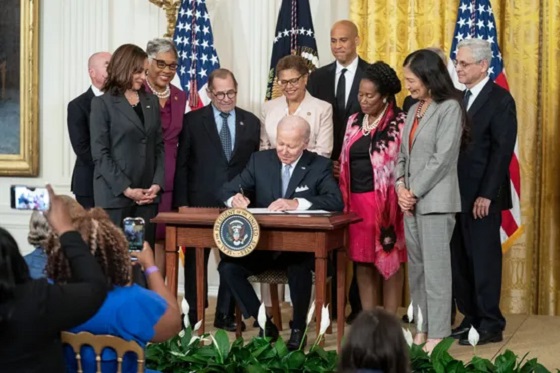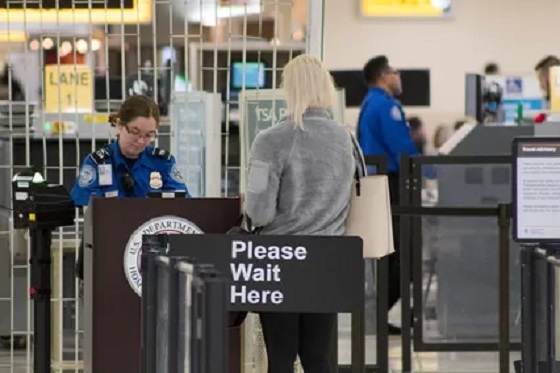International
Who really ran the country under Biden?

Quick Hit:
Republican leaders are intensifying scrutiny over former President Joe Biden’s use of the autopen and his mental fitness during his presidency. A new House investigation and calls for Senate hearings aim to determine whether Biden was actually making executive decisions or if unelected aides acted in his place. This renewed focus follows revelations about Biden’s mental decline and increasing evidence that raises constitutional concerns about the legitimacy of actions taken in his name.
Key Details:
-
House Oversight Committee plans to subpoena key Biden aides over autopen use.
-
GOP Senators push for hearings into Biden’s competency and health.
-
Reports and firsthand accounts depict Biden as detached and cognitively impaired during key presidential decisions.
Diving Deeper:
Liz Peek, a former Wall Street partner and opinion contributor for The Hill, has raised sharp questions about the legitimacy of Joe Biden’s presidency in a recent column titled “Who Was Really Running the Country While Biden Was President?” Peek lays out a compelling case that Biden may not have been in control of the executive branch, citing growing GOP efforts to investigate the use of the autopen and Biden’s apparent cognitive decline.
House Oversight Chair James Comer (R-Ky.) announced his committee would investigate the use of autopen signatures on major executive actions—including what Peek calls “broad (and possibly unconstitutional) pardons for family members, members of the January 6 Committee, and Anthony Fauci.” Comer said he intends to subpoena Biden aides Annie Tomasini, Anthony Bernal, and Ashley Williams, alleging they may have “run interference” for the president and overseen the use of the autopen.
Meanwhile, Senator Ron Johnson (R-Wis.) is calling for Senate hearings on Biden’s health and decision-making capacity. “We have to. I mean, who was running the government?” Johnson told Axios. His concerns are echoed by newly revealed audio from Special Counsel Robert Hur’s interview with Biden, which exposes a man who is more than just forgetful. Hur described Biden as “an elderly man with a poor memory,” but Peek contends the audio reveals “a person who has experienced serious mental decline.”
Peek references the book Original Sin by Jake Tapper and Alex Thompson, which documents how Biden’s aides went to “extreme measures” to conceal his decline. Peek asserts: “It’s become increasingly clear that it was not Biden” who was calling the shots between 2021 and 2024.
House Speaker Mike Johnson’s personal meeting with Biden in February 2024 may have been the most telling. Johnson recounted how Biden flatly denied having issued a recent pause on liquefied natural gas exports—a pause he himself had signed via executive order. “I didn’t do that,” Biden told Johnson, who left the meeting “shaken” and later said, “We are in serious trouble — who is running the country? Like, I don’t know who put the paper in front of him, but he didn’t know.”
Another alarming anecdote comes from then-Speaker Kevin McCarthy, who noted that Biden often “mumbled” and clung to note cards during debt ceiling negotiations. “He’s not the same person,” McCarthy said, recalling his earlier meetings with Biden as vice president.
The core constitutional concern, as outlined by the Oversight Project, formerly part of the Heritage Foundation, is straightforward: “The Constitution vests the power of pardon in one person and one person only — the President of the United States.” If Biden did not personally issue pardons and other orders, their legal standing may be on shaky ground.
Questions remain about who within the White House truly wielded power. Peek points to longtime advisers like Mike Donilon and Anita Dunn, but adds, “We just don’t know.” She warns this is “not just a fishing expedition,” asserting that “Congress could challenge the legality of measures adopted by presidential aides or officials, rather than the country’s chief executive.”
Liz Peek closes with a strong statement on the stakes: “These challenges to the Biden legacy are just beginning. And it’s about time.”
International
No more shoes off: Trump ends TSA’s decades-old rule

 MxM News
MxM News
Quick Hit:
The Trump administration is phasing out one of the most despised airport security policies in America: the requirement to remove shoes during TSA screening.
Key Details:
- Passengers will no longer be required to remove their shoes at airport security checkpoints in coming weeks.
- The change is rolling out at Baltimore, Fort Lauderdale, Cincinnati, Portland, Philadelphia, and Piedmont Triad airports.
- White House Press Secretary Karoline Leavitt confirmed the policy reversal on Tuesday morning.
Diving Deeper:
The Trump administration announced it is ending the much-loathed Transportation Security Administration rule requiring passengers to remove their shoes during security checks, a mandate that has frustrated Americans since its introduction nearly two decades ago.
The change is being implemented first at Baltimore/Washington International Airport, Fort Lauderdale International Airport, Cincinnati/Northern Kentucky International Airport, Portland International Airport, Philadelphia International Airport, and Piedmont Triad International Airport in North Carolina, according to CBS News. The policy will expand to additional airports nationwide in the coming weeks.
White House Press Secretary Karoline Leavitt shared the news on X, posting, “Big news from [the Department of Homeland Security]!” Tuesday morning. A TSA spokesman told The New York Times that “TSA and DHS are always exploring new and innovative ways to enhance the passenger experience and our strong security posture,” suggesting the policy change is part of broader improvements under President Trump’s leadership.
The policy to remove shoes was first instituted in 2006, stemming from the December 2001 attempt by Richard Reid, known as the “shoe bomber,” to ignite explosives hidden in his shoes on a flight from Paris to Miami. Reid was sentenced to life in prison after pleading guilty to terrorism charges, but critics have argued the policy punishes every American traveler for the actions of one terrorist nearly 25 years ago.
Before the update, travelers in the TSA PreCheck program were already exempt from removing shoes, belts, and jackets. Now, under President Trump’s directive to reduce pointless regulatory burdens, the policy is being eliminated for all travelers.
Daily Caller
USAID Quietly Sent Thousands Of Viruses To Chinese Military-Linked Biolab


From the Daily Caller News Foundation
By Emily Kopp
The U.S. Agency for International Development (USAID) shipped thousands of viral samples to a lab in Wuhan over the course of a 10-year program even though it had no formal agreement with the lab in place, according to previously unreported documents.
The documents show that USAID funded the exportation of 11,000 samples from Yunnan Province, where some of the closest relatives of the COVID-19 virus circulate, to Wuhan, the epicenter of the pandemic, with no apparent plan for ensuring the samples were not misdirected to bioweapons and remained accessible to the U.S. government.
A $210 million USAID public health program called PREDICT, steered by the University of California-Davis, collected viral samples in countries throughout the globe but lacked long-term storage when funding dried up, according to rudimentary plans in 2019.
Dear Readers:
As a nonprofit, we are dependent on the generosity of our readers.
Please consider making a small donation of any amount here.
Thank you!
USAID’s sample dispensation plan for China is sparse: “No need [sic] information from Yunnan. They were never an official lab partner for PREDICT. All samples they helped collected [sic] are sent to, tested, and stored in Wuhan.”
The “lab” refers to the Wuhan Institute of Virology (WIV). WIV was a close partner of USAID contractor EcoHealth Alliance and a slated partner for a PREDICT-like program supported by the State Department. The lab has poor biosafety practices and ties to the People’s Liberation Army (PLA).
One of the closest known relatives of the COVID virus is among the viruses sampled with USAID funding.
“Investigations involving USAID’s former funding of global health awards remain active and ongoing,” a senior State Department official said in a statement to the Daily Caller News Foundation. “The American people can rest assured knowing that under the Trump Administration we will not be funding these controversial programs.”
The internal documents were obtained through a FOIA lawsuit brought by U.S. Right to Know, a nonprofit newsroom and public health research group.
The shuttering of USAID – which was officially completed Tuesday – has ignited a debate about its net impact on global health. A study in The Lancet projected an association between a dropoff in USAID funding and 14 million deaths based on an epidemiological model.
Secretary of State Marco Rubio said in a statement Tuesday that USAID spending has often undermined rather than strengthened American interests.
“Beyond creating a globe-spanning NGO industrial complex at taxpayer expense, USAID has little to show since the end of the Cold War,” Rubio said. “Development objectives have rarely been met, instability has often worsened, and anti-American sentiment has only grown.”
The now-defunct agency’s connection to the Wuhan lab complicates its global health legacy.
“The USAID $210 million contract for PREDICT should have included contractual terms that required all samples, or at least copies of all samples, be transferred to and stored by a US government facility,” said Rutgers University molecular biologist Richard Ebright told the DCNF. “The PREDICT grift did none of this.”
UC Davis did not respond to a request for comment. The State Department did not respond to a request for comment.
Today marks the first day of the State Department's America First foreign assistance rebranding initiative, led by @SecRubio.
Consistent branding will ensure contributions made by the the United States will be immediately recognized as American.
"The redesign is very simple,… pic.twitter.com/HZnbOxU0Sq
— Department of State (@StateDept) July 2, 2025
Did USAID Fund COVID’s Ancestor?
Many of the viruses stored at the lab in Wuhan may have been sampled with U.S. funding yet remain out of reach for U.S. government entities investigating the origins of COVID.
The samples were set to be preserved for testing – with human samples preserved for 10 years – the documents show. But the documents suggest that requirement was never incorporated into a formal contract with USAID.
The two scientists supervising the samples were: Ben Hu, a virologist at the WIV, who reportedly became sick with COVID-like symptoms in 2019; and Peter Daszak, a scientist who was debarred from federal funding after the U.S. government deemed him a threat to public safety for inadequate oversight of the research in Wuhan.
Hu and Daszak did not reply to requests for comment.
The documents show PREDICT contractors discussing viral samples taken from wildlife and stored in India, Liberia, Malaysia, the Republic of Congo and China. Some of the samples were stored in virus-transport media (VTM), which allows researchers to store live viruses for later use in the lab.
“It’s not rocket science to require a contract and supporting paperwork which establishes a relationship, testing protocol, and chain of custody, when one is sending out lab samples,” said Reuben Guttman, a partner at Guttman, Buschner & Brooks PLLC who specializes in ensuring the integrity of government programs, in an interview with the DCNF. “In any scientific endeavor, you need confidence in your results. That requires paperwork to prove your methodology is sound.”
-

 Indigenous2 days ago
Indigenous2 days agoInternal emails show Canadian gov’t doubted ‘mass graves’ narrative but went along with it
-

 Bruce Dowbiggin2 days ago
Bruce Dowbiggin2 days agoEau Canada! Join Us In An Inclusive New National Anthem
-

 Crime2 days ago
Crime2 days agoEyebrows Raise as Karoline Leavitt Answers Tough Questions About Epstein
-

 Business2 days ago
Business2 days agoCarney’s new agenda faces old Canadian problems
-

 Alberta2 days ago
Alberta2 days agoAlberta and Ontario sign agreements to drive oil and gas pipelines, energy corridors, and repeal investment blocking federal policies
-

 Alberta2 days ago
Alberta2 days agoCOWBOY UP! Pierre Poilievre Promises to Fight for Oil and Gas, a Stronger Military and the Interests of Western Canada
-

 Crime1 day ago
Crime1 day ago“This is a total fucking disaster”
-

 International1 day ago
International1 day agoChicago suburb purchases childhood home of Pope Leo XIV




